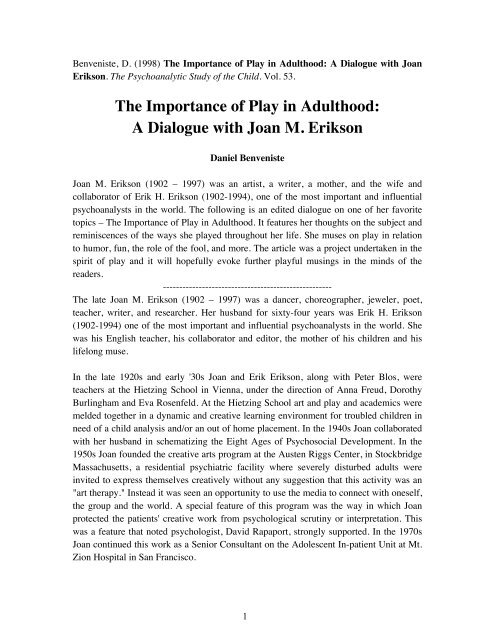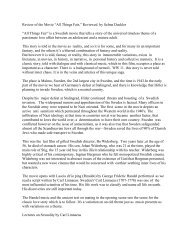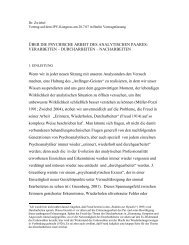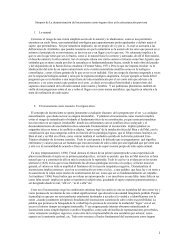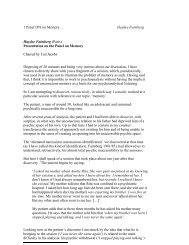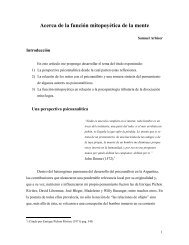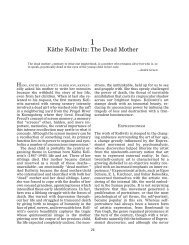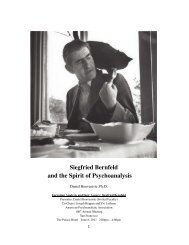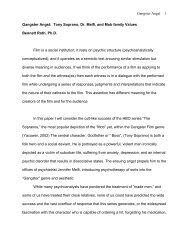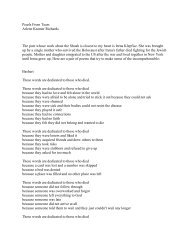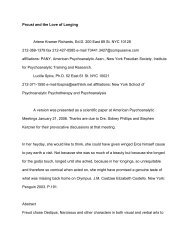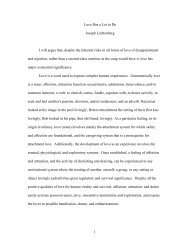Joan Erikson - Importance Of Play - International Psychoanalysis
Joan Erikson - Importance Of Play - International Psychoanalysis
Joan Erikson - Importance Of Play - International Psychoanalysis
Create successful ePaper yourself
Turn your PDF publications into a flip-book with our unique Google optimized e-Paper software.
Benveniste, D. (1998) The <strong>Importance</strong> of <strong>Play</strong> in Adulthood: A Dialogue with <strong>Joan</strong><br />
<strong>Erikson</strong>. The Psychoanalytic Study of the Child. Vol. 53.<br />
The <strong>Importance</strong> of <strong>Play</strong> in Adulthood:<br />
A Dialogue with <strong>Joan</strong> M. <strong>Erikson</strong><br />
Daniel Benveniste<br />
<strong>Joan</strong> M. <strong>Erikson</strong> (1902 – 1997) was an artist, a writer, a mother, and the wife and<br />
collaborator of Erik H. <strong>Erikson</strong> (1902-1994), one of the most important and influential<br />
psychoanalysts in the world. The following is an edited dialogue on one of her favorite<br />
topics – The <strong>Importance</strong> of <strong>Play</strong> in Adulthood. It features her thoughts on the subject and<br />
reminiscences of the ways she played throughout her life. She muses on play in relation<br />
to humor, fun, the role of the fool, and more. The article was a project undertaken in the<br />
spirit of play and it will hopefully evoke further playful musings in the minds of the<br />
readers.<br />
----------------------------------------------------<br />
The late <strong>Joan</strong> M. <strong>Erikson</strong> (1902 – 1997) was a dancer, choreographer, jeweler, poet,<br />
teacher, writer, and researcher. Her husband for sixty-four years was Erik H. <strong>Erikson</strong><br />
(1902-1994) one of the most important and influential psychoanalysts in the world. She<br />
was his English teacher, his collaborator and editor, the mother of his children and his<br />
lifelong muse.<br />
In the late 1920s and early '30s <strong>Joan</strong> and Erik <strong>Erikson</strong>, along with Peter Blos, were<br />
teachers at the Hietzing School in Vienna, under the direction of Anna Freud, Dorothy<br />
Burlingham and Eva Rosenfeld. At the Hietzing School art and play and academics were<br />
melded together in a dynamic and creative learning environment for troubled children in<br />
need of a child analysis and/or an out of home placement. In the 1940s <strong>Joan</strong> collaborated<br />
with her husband in schematizing the Eight Ages of Psychosocial Development. In the<br />
1950s <strong>Joan</strong> founded the creative arts program at the Austen Riggs Center, in Stockbridge<br />
Massachusetts, a residential psychiatric facility where severely disturbed adults were<br />
invited to express themselves creatively without any suggestion that this activity was an<br />
"art therapy." Instead it was seen an opportunity to use the media to connect with oneself,<br />
the group and the world. A special feature of this program was the way in which <strong>Joan</strong><br />
protected the patients' creative work from psychological scrutiny or interpretation. This<br />
was a feature that noted psychologist, David Rapaport, strongly supported. In the 1970s<br />
<strong>Joan</strong> continued this work as a Senior Consultant on the Adolescent In-patient Unit at Mt.<br />
Zion Hospital in San Francisco.<br />
1
In 1976 Activity, Recovery, Growth: The Communal Role of Planned Activities was<br />
published in which <strong>Joan</strong> and her co-authors, David and <strong>Joan</strong> Loveless, described her<br />
work at the Austen Riggs Center. <strong>Joan</strong> <strong>Erikson</strong> had previously published three other<br />
books, Mata Ni Pachedi: A Book on the Temple Cloth of the Mother Goddess (1968), The<br />
Universal Bead (1969, 1993) and St. Francis and His Four Ladies (1970). She<br />
subsequently co-authored Vital Involvement in Old Age (1986) with Erik H. <strong>Erikson</strong> and<br />
Helen Q. Kivnick and more recently authored Wisdom and the Senses (1988), Legacies:<br />
Prometheus, Orpheus and Socrates (1993), and Poems (1996). She also translated 20<br />
Poems from the Book of Hours: Rainer Maria Rilke (1988). In 1997 her three chapters on<br />
“The Ninth Stage” of psychosocial development were published in a re-edition of Erik<br />
<strong>Erikson</strong>’s The life Cycle Completed.<br />
In May of 1996 I spent five days with <strong>Joan</strong> M. <strong>Erikson</strong> at her home in Harwich on Cape<br />
Cod. We drank tea in the mornings and port in the evenings. We collected sea shells at<br />
the beach, took walks, sang songs, recited poetry, watched the birds feeding, listened to<br />
the song birds and talked about the importance of play in adulthood. The following is an<br />
edited dialogue based on our tape-recorded conversations.<br />
-DB<br />
Daniel Benveniste: <strong>Joan</strong>, when you first proposed this topic, The <strong>Importance</strong> of <strong>Play</strong> in<br />
Adulthood, I thought about all the ways that you have been creative in your life. But then<br />
it occurred to me that before getting in to all that, we would probably do well to begin<br />
this discussion with a working definition of play. So, how would you define play?<br />
<strong>Joan</strong> M. <strong>Erikson</strong>: <strong>Play</strong> is what you do, in a lighthearted way, for your own pleasure<br />
because you find it amusing and enhancing somehow. Many will say that the opposite of<br />
"play" is "work" but I say that the opposite of "play" is "obey." A child may be playing<br />
and having a good time but the play comes to a stop when there is a demand to obey. An<br />
adult will play or work, but for a child, there is no work. So the opposite of play is the<br />
order to stop, because you're told to, or you're told to do something else, or, in some way,<br />
you're interrupted by an adult or someone in charge of you who has the authority to say<br />
"Now you stop playing and do this, that or the other."<br />
DB: It seems to me that one can be constricted by obeying limits and that one can be<br />
guided by obeying limits. If the walls of a sandbox constrain more than they contain the<br />
play will be limited. If the constraints force us to obey too much, we're probably<br />
performing more than playing.<br />
2
JE: Yes and I think you're not as free to play in the same way if you know you've been<br />
told to do something. You might override the limit but I think it often drives the<br />
playfulness out of the play.<br />
Adults often place too much emphasis on their duty to finish up what they are doing. It’s<br />
almost like a promise to themselves to do something. But then they feel they let<br />
themselves down by being sidetracked. And that's the way they look at play - as a kind of<br />
sidetrack - even though play can be very refreshing.<br />
We really shouldn't take ourselves so seriously. We're a joke, you know, whichever way<br />
you look at it, we're a joke. And taking yourself seriously is certainly a joke because you<br />
lose all the freedom of motion that you had before you started out on whatever course<br />
you're following. And if that goal is more important than anything else, then heaven help<br />
you. There's always more than one way to go. You have choices all along the way. <strong>Play</strong><br />
helps us to be aware of the fact that we do have choices. If you think you don't have<br />
choices, then you're in a tight hole and you aren't going to do anything very well.<br />
It's "play" when you're doing things that you really haven't got time for. There's a kind of<br />
a release in doing something you know perfectly well you shouldn't be doing at that<br />
moment because there are other things that are important that you're leaving out - but you<br />
play just the same, because you need that moment of relaxation. And if you don't allow<br />
yourself that time and that freedom, there's something wrong.<br />
DB: How do you play? What forms has your play taken throughout your adulthood?<br />
JE: Well, I sew and I weave and I make things and I love making things. It gives me<br />
pleasure and it looks like work but it isn't because it’s a pleasure to do it. I don't have as<br />
many skills as I used to have and that sobers me. I don't undertake to make myself a<br />
dress, which I used to, or make something complicated for myself or anybody else. Partly<br />
that's because my eyesight isn't so good anymore and partly because I don't have the<br />
skills in my fingers that I once had.<br />
Bead making was a borderline thing for me, on the border between work and play. I<br />
loved doing it and it was great fun to make beautiful things. I enjoyed the process and<br />
was very pleased with the product but sometimes it could be work when it was a<br />
challenge. Sometimes I sit and talk with people that I am interested in. That can be play.<br />
A conversation can be play.<br />
DB: What makes a conversation playful?<br />
3
JE: A conversation becomes playful when you don't know what the response is going to<br />
be to anything that you say and you say what you want with the idea that there will be a<br />
response to it. That can be fun but also very unpredictable. It can be fun or it can be a let<br />
down but there is always a potential.<br />
DB: You say that you have played as an adult by sewing, weaving, bead making, and in<br />
conversation. How else have you played as an adult? How else have you gone to the edge<br />
of your not knowing?<br />
JE: I write. Writing can be play too - a playing with words. If you write something and it<br />
pleases you, that's play. If there's a push behind it, it's not play. If there's a push behind it,<br />
the lightness of it goes.<br />
DB: That "push," as you say, betrays a plan, an agenda and an effort to achieve a<br />
prescribed goal. Striving for a goal and efforts to perform can be worthwhile endeavors in<br />
their own right but they lack that playful spirit that you were referring to. They might be<br />
satisfying but they aren't always fun and certainly aren't funny!<br />
JE: That's right and humor has quite a lot to do with play. "Humidity" is etymologically<br />
related to a sense of "humor." Humor pertains to the movement of the essences or humors<br />
within you. The Latin root of "humor" is "umor" meaning liquid or fluid. Humor is<br />
something that flows, resembles water itself, and symbolizes the movement of<br />
unconscious forces, which gradually evolve into the basic characteristics of an individual<br />
and express themselves in the body in moods, in emotional reactions, in qualities and in<br />
feelings of the mind and spirit. A capacity to appreciate or understand a situation is also a<br />
part of a sense of humor. Those with a sense of humor do not laugh at others, just at the<br />
ridiculous. It’s a healing kind of laugh.<br />
There is a joy when any disproportion is restored to the proper proportion. And<br />
sometimes, if you overdo things, it becomes a laughing matter. But our natural ability to<br />
play is lost when humor is missing. Performances, games, sports, and the rest all become<br />
big business. Many yearn for the spirit of play unattached to gain. Schiller says "Man is<br />
only fully human when he is at play for itself." Another important part of play is a sense<br />
of wonder, which sets the stage for the freedom and simplicity that are so integral to play.<br />
I think it’s a loss to Christianity that the Gospels don't convey the humor and playfulness<br />
that Jesus must certainly have had. It seems obvious to me that he loved little children<br />
and their straight forward ways. You know, he said, "Suffer the little children to come<br />
unto me and forbid them not, for of such is the Kingdom of Heaven." In other words,<br />
Allow the little children to come unto me and forbid them not, because its meant for<br />
them. They're part of it!<br />
4
I make a distinction between "Games" and "<strong>Play</strong>." "Games" demand a beginning and an<br />
ending, with winning or losing; they have rules and boundaries, and are time bound.<br />
Surprises are a hazard and spoil the games. But "play" has no ending. It strives for<br />
continuation and change. Surprises enhance the play. They are invited and hoped for.<br />
Vulnerability is accepted and can be incorporated. With some leeway, there's some<br />
ground to stand on, to play on. Shakespeare was the most perceptive poet who ever lived.<br />
He recognized quite wisely that sleep is perhaps the world's freest play area, for when we<br />
sleep, we engage in that great free play of the senses and the mind -- we dream. Erik<br />
spoke of: "<strong>Play</strong> that juggles sense - mind - fantasy with a creative chuckle." Put another<br />
way, "<strong>Play</strong> that juggles perception - intellection- imagination with creative skill and fun."<br />
Imagination is the free play of perception and intellection with no holds barred -<br />
unending play with thoughts, ideas, memories - all the "toys and reasons" of the mind.<br />
When Einstein looked back on his method of thinking and working, he was convinced<br />
that fantasy had been his greatest asset. <strong>Play</strong> offers the leeway to let images, thoughts,<br />
ideas, turn things upside down, inside out, in a sensible, non-sensible way. <strong>Play</strong> is, I hold,<br />
an attitude, not only an activity. It can pervade your life and make you creative - and<br />
alive. Blake wrote: "The child's toys and the old man's reasons are the fruits of the two<br />
seasons." Without the play of the child in us, few creations, ideas or inventions, and few<br />
valuable reasons would be forthcoming, and little wisdom would ripen as we grow old.<br />
A sense of humor is communicable and I would say that a sense of humor is, in fact, the<br />
royal road to freedom - freedom from the pretension of ego in himself, herself or another.<br />
To laugh at oneself, one must override all sense of pride. That's the best way to laugh. A<br />
sense of humor is only a sense of humor if you've got it about yourself.<br />
DB: When you say, "Humor is the royal road to freedom." it seems that you are playing<br />
with Freud's statement that "The dream is the royal road to the unconscious."<br />
JE: Yes, and I think its a safe road to take. The gift of child's play is a natural joy. We<br />
lose a lot when we use the word "play" to describe so many things that aren't play. <strong>Play</strong> is<br />
for the joy of it - for the fun of it. Games and sports and theater and musicians playing<br />
jazz or rock 'n' roll are all described in terms of "play" but often they are not.<br />
So often it is said that the fool and the child are hidden in each of us. When we lose play<br />
we lose the child and the fool as well. Laughter is at the heart of things. The divine<br />
comedy of being, is the fool in the palace. Those who have a sense of humor do not laugh<br />
at a person but rather in a simple feeling of delight in the ridiculous, wherever it is<br />
manifested. In such laughter there is no condemnation of the other or the self, just the<br />
5
ecognition of the loss of proportion. That's a healing thing, not a destructive thing.<br />
Humor enables us to endure and find meaning in life's comedies and tragedies, its<br />
seriousness and its absurdities.<br />
<strong>Play</strong> is conspicuously missing from our society. Gaiety and laughter and the child within<br />
each of us are all lost in exact proportion to the loss of our ability to play. Schopenhauer<br />
says, "A sense of humor is the only divine quality of man." And T.S. Elliot says that,<br />
"Laughter is at the heart of things."<br />
I think its wonderful, if, as you grow old, you can be more and more capable of accepting<br />
and laughing and seeing things as funny instead of being distressed by them, since there<br />
is so very little you can do anyway. Aging is a process of becoming free. I think it’s a<br />
very good idea to not take oneself too seriously.<br />
DB: I'm intrigued by your reference to "the fool in the palace." I think of both the<br />
political structure of having a "fool in the palace" but also the metaphor of psychic<br />
structure as a kingdom and the need to have a fool, or a lighthearted spirit, around to keep<br />
the psychic equilibrium of the kingdom from getting too rigid, brittle, controlled, and<br />
closed. It's a good metaphor but you were speaking of "the fool in the palace" specifically<br />
as a role in a political structure. Could you say more about that?<br />
JE: Well to tell you the truth, I think the fool in the palace was one of the most intelligent<br />
things a community ever planned. The king would weigh all the pros and cons of a<br />
situation but there was always a fool there who would have the privilege and<br />
responsibility of saying to the king "Now listen here, King, don't you think you're going a<br />
little too far? Lets not get into this too deeply or we'll never get out of it." The fool was<br />
allowed that kind of freedom. The king loved the fool and he always brought the king<br />
back to something less severe, less cut and dried. The fool would always put something<br />
in that would make the people giggle and even make the king laugh. In this way, it<br />
lightened his load tremendously.<br />
But what a brave character the fool had to be, because he could never really tell when he<br />
might be over-doing it. When the king would decide something that was too obviously<br />
harsh, the fool might come in and say, "Oh my god, that poor creature, he won't have<br />
another drink of water for six weeks!" or "Are you going to cut their heads off and line<br />
them up in a row?" Overblown statements would make the group laugh and help the king<br />
to see his decision in a new light. They would put him back into a normal position, as if<br />
he were a human being, instead of a king. I think it’s stunning that that was possible then.<br />
The king and the court loved the fool and there was great affection for him.<br />
6
DB: What do you think would happen in a kingdom without a fool?<br />
JE: What would happen? It happens all the time. Read the newspaper.<br />
DB: Oh, yeah! I forgot! But you know it seems to me that your husband, Erik <strong>Erikson</strong>,<br />
was involved in a lot of very serious work throughout his life - personal psychoanalyses,<br />
the evaluation of Hitler's personality during the war for the United States government,<br />
work with returning war veterans, historical analyses, psychobiographical research,<br />
investigation of religious issues, and so on. How would he play? How would he integrate<br />
the playful spirit of the fool?<br />
JE: Well, one thing you could say about Erik is that he knew how to laugh. He really did.<br />
His laugh was contagious and he said amusing things. He had a good sense of humor. He<br />
didn't take everything he did seriously. He had a wonderful sense of humor.<br />
DB: I recall now that he was also an artist. I seem to recall that his interest in the arts<br />
dated back to his childhood or at least into adolescence. What about you, how did you<br />
play as a child?<br />
JE: Well, it was very clear in the parsonage, where I grew up, that there were lines that<br />
you didn't cross and it was made explicit to you right from the first. So you knew<br />
whenever you were overstepping the line. When my father came into the dining room at<br />
breakfast time or lunchtime or whenever, you had to be focused on the fact that you were<br />
going into the dining room. You were going to be sitting down and being with the rest of<br />
the family. You had to be focused on that because if you went in there and went on<br />
laughing and giggling over the thing you had been talking about or playing with, with the<br />
rest of the kids, he would say in a deep voice "No nonsense in this house." and he meant<br />
it. He wanted quiet because he wanted to say grace before we had the meal. When he said<br />
"No funny business and no giggling." we knew that the play had to stop momentarily.<br />
Then as soon as he'd said grace, everyone was free to say what they wanted to and to<br />
giggle and be what they liked. And while there were lines that were very carefully held,<br />
we were allowed to do our laughing and giggling and all that kind of thing in the<br />
playroom, which was there for that purpose, and we made free use of it. We would make<br />
fun of everything we had seen. We repeated what we had heard, out there in the dining<br />
room or in church.<br />
For example, my brother played the role of the parson. He would hold his hands the way<br />
father did when he was preaching. I don't know why father did this but we were on to it.<br />
We thought that was just what you did. He'd put all the fingers together in an open way<br />
7
like this. This is the way he preached. So my brother would do the same thing. Then we<br />
would have these two sermons that we would say. One of them was:<br />
"Dearly beloved brethren, is it not a sin<br />
for when you peel potatoes, to throw away the skin?<br />
For the skin feeds the pigs, and the pigs feed you.<br />
Dearly beloved brethren, is this not true?"<br />
And then we would all giggle to ourselves! Then the other one was:<br />
"What is love? Oh, let me tell you. 'tis a passion so intense,<br />
that it oft destroys the reason, rends to tatters common sense.<br />
When our lives are not without it, 'tis a blessing from above.<br />
And it either makes or mars us, 'tis this blessing we call love."<br />
Oh, and then we used to also say:<br />
"Algie met a bear.<br />
The bear was bulgy.<br />
The bulge was Algie."<br />
DB: Its funny, the things we remember. Now, let's see you were born in 1902, so your<br />
early childhood, and these memories of play, must have been taking place around 1907 or<br />
1910, somewhere around there. What else do you recall playing in those early childhood<br />
years?<br />
JE: Well, I remember I broke my dolls head. My doll had a porcelain head and I was<br />
pushing the doll down the hill in a little stroller when the doll fell over. It fell out and its<br />
head was broken. So we had to have a proper burial for this doll and all of that was done<br />
with great ceremony. You see hearing all the things that we heard as children around the<br />
parsonage we just picked it up wherever we were. I'm sure we had been to funerals by<br />
then. In fact, I remember I went to my grandmother’s funeral. It was very weepy and sad.<br />
So we had a funeral for the doll but then when we got the child all buried, I had a fit<br />
because we had buried the child and I had to have it back so we had to dig it up again!<br />
DB: As a child I loved imaginative play. As a teenager I started to really enjoy dancing.<br />
And I still enjoy dancing to this day.<br />
JE: Well, we have that in common. It meant so much to me that dance could become<br />
such an important part of me for a number of years. It's just amazing what dance did for<br />
me. It freed me to leave home and go off to Austria as a young woman in the 1920s.<br />
Imagine! I didn't speak any German and I just went off with nothing.<br />
8
DB: How did you get interested in dance?<br />
JE: In high school we did some movement to rhythm. It wasn't dance but it was rhythmic<br />
movement. I had always thought that dance was when little girls came out and did<br />
goodness-knows-what, and that didn't appeal to me at all. But then when I went to<br />
Columbia we had a teacher who came to teach us one day and she was a big woman and I<br />
thought. "God, here is a woman - that size - dancing. Well, if she was dancing, it<br />
certainly must be alright for me to dance." And I just remember leaping from one thing to<br />
the other because I was just so excited to do it. And in no time at all I found other places<br />
and people who were teaching dance too. So, I would go off and get further training here<br />
and there from the other teachers in town. It was very exciting for me.<br />
I could play the games but they didn't satisfy me the way the dance did. After completing<br />
my undergraduate degree at Columbia, I took a master's degree at Teachers College at<br />
Columbia and then taught at Teacher's College and Barnard College. This was in the<br />
1920s when modern dance was just coming out and I just loved it. Ballet is what I<br />
thought was so awful. To become a ballerina you do things that distort yourself. It’s all<br />
posed. It isn't flowing. You do this thing and then the next thing. And they use their feet<br />
badly and put very tight things around their feet. I thought that was awful. I was<br />
interested in modern dance.<br />
So, I went to the head of the department and said, "Look I want to go to Europe to study<br />
modern dance over there and I want to write it up so I can tell you what's going on over<br />
there." And he listened very severely to all of this and I said, "If you could help me out,<br />
financially, so I could afford to get there, I could do this and then I could report back."<br />
And he said, "Well, if I thought you'd ever come back free, I'd do it. But you never will.<br />
You're gonna get married over there." Which I did!<br />
So I just went over with nothing. I just took a big jump and there I was in that big country<br />
and I didn't even speak the language. It was very funny when I first got there. I would<br />
unknowingly say the most awful things as I struggled to learn these new languages. I<br />
remember going into a shop and I wanted to weigh a package so I could send it and<br />
instead of saying, "I want to weigh something so I can put postage on it." I said, "I must<br />
have a bassinet. I'm going to take a chance." and the two men there laughed, looked at<br />
each other and said, "Well, why not?"<br />
Anyway I went to the dance schools and I would say politely in whatever language they<br />
could understand that I wanted to come and stay there and be there for a while and<br />
observe what they were doing. And they would say, "Well what harm could it do?" and<br />
they'd let me come and let me participate, partly because it was very unusual for an<br />
9
American to do that and they probably also thought, "Well for the love of Pete, she's sure<br />
got her nerve!" So I went and I could tell from the music what it was they were trying to<br />
do and I could do things they couldn't do because they didn't know anything about<br />
syncopation. So if there was some syncopated music I could do it. I was on the right note<br />
and they just thought that was magnificent. But I was making all sorts of other mistakes<br />
and saying funny things and it’s just a miracle that I got by.<br />
Then I had heard that there was a class up on the north shore, in Germany. I went to this<br />
class and just did what everyone else was doing and it kept me in good shape but I<br />
couldn't talk to anybody at all. It was more like gymnastics. Then I went to look for<br />
Isadora Duncan's school in Austria. She wasn't there when I arrived but we did the best<br />
we could without her. She wasn't there but her three best teachers were all there. She left<br />
them in charge of the thing over the summer and I was with them but I never did work<br />
with her, unfortunately.<br />
Then I got a job working at a school where the teacher was English speaking. I helped her<br />
and that was how I earned my way. That was in Austria. I was teaching children at that<br />
school because I thought it was wonderful teaching children who were that little. I would<br />
start them off with dance of various kinds and they just took to it - and so did the woman<br />
I worked for. Then they had a big ball, the last week before Lent, and that's where I met<br />
Erik. I had said, "Hello." to him once before, after a performance, so I knew who he was.<br />
And when I saw him again at the ball, we were all in costume. We wore masks at first<br />
and then later on you could take them off. It was held at a beautiful summer palace. I<br />
wore a long blue dance costume - scant but comfortable. And Erik was all dressed in red,<br />
like a sheik. So we danced and "we could have danced all night" and we did! And then,<br />
when we got worn out, we would sit out on the sidelines where we could watch<br />
everybody go by. Everybody dressed up like somebody from somewhere else, and we<br />
would look at them and say, "Hmm, why don't we go there." We danced all night and<br />
had breakfast in the morning just before we took the train back to town<br />
DB: Did Erik like to dance throughout his adulthood?<br />
JE: Oh yes, he never liked to dance by himself. He never took it up as I did but he would<br />
dance with people.<br />
DB: In my family, everyone loves to dance and needs to dance too.<br />
JE: Ah, well so do I. The rhythm is there whether you like it or not. And there is nothing<br />
to replace it at all. There is nothing to replace dance. You can dance by yourself or with a<br />
partner or partners but without it, life wouldn't be worth a nickel. That's the truth. Crazy,<br />
10
ut true. But how I love it. It’s as if the music takes hold of you and there is just nothing<br />
you can do about it. You have to be part of it and keep moving your body. Now, I dance<br />
sitting down a lot.<br />
DB: What is the relation between modern dance and play?<br />
JE: Modern dance is free and freeing. I went to a show the other day in Cambridge where<br />
there were men and women in two groups and you couldn't tell a man from a woman.<br />
They all wore exactly the same thing and the men had let their hair grow and the women,<br />
some of them, had their haircut. There was no differentiation. You couldn't say for sure if<br />
it was a man or a woman that was dancing. It was so unbelievable to see this. It was<br />
fantastic! I've never seen men do things like this. And they delighted in it. You didn't<br />
know who was which and it didn't matter. It was very interesting. I think the difference<br />
that we make between men and women and what they should do and how they should be<br />
is so ridiculous. We demand these things in a stupid kind of way. I think it’s just as<br />
appropriate for a woman to hold a door for a man as it is for a man to hold it for a<br />
woman. We've stressed this thing about being gentlemanly toward women and women<br />
holding back and waiting for men to encourage them, but its phony. And it interests me<br />
tremendously to see this oneness on the stage. It's interesting when you think back far<br />
enough - who drove the carriage? It was always the men and now we have women who<br />
have cars just as often as men. At least we've broken that down. So little by little these<br />
things are not being taken so much for granted and things are changing.<br />
I don't know what will happen. I can't envision the future but I think there will be more<br />
reciprocity when we don't make such distinctions between men and women in the kinds<br />
of things we talk about and the kinds of things we do and everything else. And for all of<br />
that, a sense of humor is very necessary to assist in bringing down all of these strange<br />
hurdles or obstacles.<br />
DB: Do you feel that there were options or opportunities that you missed because you are<br />
a woman?<br />
JE: Well, it’s hard to say. As you see I took terrific jumps. I studied modern dance, I<br />
went to Europe, we came back to the United States and so on.<br />
DB: These terrific jumps and playful leaps seem to suggest a kind of "transcendence<br />
within limits" so to speak. <strong>Of</strong> course, one can be playful with colors, shapes, and<br />
materials in artistic expression but it seems to me that one can also be creative in social<br />
relations as well.<br />
11
JE: Yes, and that reminds me of a poem we used to recite a long time ago. We would<br />
say:<br />
"Once there was a way, I had to do my best to please<br />
And change with every passing lad, to suit his the-o-ries<br />
But now I know the things I know, and do the things I do<br />
And if you do not like me so, to hell, my love, with you."<br />
As I recall there was quite a lot of that kind of rebellious feeling at that time in women.<br />
There was some writing, I vaguely remember, in that spirit where women were saying,<br />
"No. I'm gonna do the things I want to do and so be it."<br />
DB: <strong>Joan</strong>, it seems to me that you and Erik and Peter Blos were taking some leaps and<br />
being pretty innovative at the Hietzing School as well. I read that at that school,<br />
organized and run by Anna Freud, Dorothy Burlingham and Eva Rosenfeld, in the 1920s<br />
and '30s, you structured the academic work in accordance with the Project Method, in<br />
which the children's interests were engaged in a particular subject matter such as "The<br />
Eskimos" and that the children were then drawn into mathematical, historical, scientific,<br />
geographical, and literary investigations of the subject.<br />
JE: Yes, and when Kai, my oldest child, was born I used to take him to school and he'd<br />
be outside in the yard when I was teaching inside. And the children would come and say<br />
"Kai weint." - Kai is crying. - And then we'd have to go out and take care of Kai and it<br />
was all very fun and very sweet, in a way. The Burlinghams were all English speaking so<br />
they couldn't just throw their children into a German school so they created this school<br />
and Peter and Erik and I taught there and between us we got a lot of stuff done. Erik was<br />
a very good teacher. We had fun there. I was teaching a certain amount of dance But I<br />
had to teach it on their terms - on the children's terms - so that it didn't seem feminine,<br />
you know. I'd give them ropes to swing like this and they would love doing it and the<br />
boys wouldn't feel that we were trying to make women of them.<br />
DB: When were you and Erik married?<br />
JE: Well, actually we weren't married until after our first two boys were born but when<br />
we did get married we were married three times over on or around April Fools Day<br />
because we decided that was the way to do this. It amused us to get married on April<br />
Fools Day. We had to go to the government man first, so we did it legally. Then we did<br />
one in the Anglican Church there and then we did another one in the Jewish temple<br />
because Erik's family was Jewish. So we did all three.<br />
12
DB: When was it that you left Vienna?<br />
JE: In 1933. We knew the war was coming on because everything told us it was. Much<br />
of Austria was kind of laughing it off. They didn't think anything was going to happen<br />
but the Germans were so obviously all in stride and ready and I knew that if we had to go<br />
through Germany to get home we'd never make it. I had two little boys and we had to get<br />
out of that country and I just said, "Look we have to get out of here."<br />
I had a British passport because I was born in Canada so I was English. Well if we would<br />
have stayed, I would have lost that because I had married Erik and it didn't matter what<br />
the wife was because you become what he is. So I would have become a German, as he<br />
was at that point, and I didn't go for that. So, all I could think of was, we have to get out<br />
of here and I started to say, "We're leaving."<br />
The analysts thought we were pretty silly for leaving and thought we were over-reacting<br />
and so on. "You're crazy to be so upset. Hitler's not going to do anything." But we knew<br />
Austria couldn't do a damn thing against Hitler. So we got out and I never did anything<br />
smarter. And then the other analysts had a terrible time getting out. I had taught a lot of<br />
them English. That was one way I was making some money at that point. I would go to<br />
their houses and teach them this and that, hoping it would help them when they wanted to<br />
get out, and it did. "You're being ridiculous." they said. And I thought "Oh no, I'm not.<br />
I'm here with two little sons and I'm not gonna have them dangle around here with people<br />
trying to decide who are they and what are they. We're goin'!"<br />
So we got on the Polish corridor because it was just one line of traffic that could take<br />
you from wherever you were in Austria right to the North Sea and from there you could<br />
get a boat to take you the next step. So we went to the North Sea and got on a cattle boat<br />
going to Copenhagen. We decided to go to Copenhagen to see if we could get back Erik's<br />
original citizenship there. Well we got on the cattle boat and went but Denmark didn't<br />
take us in lovingly. They let us stay until I could get my family in action and they were<br />
the ones who made it possible for us to go from there to New York. And on the boat we<br />
met a representative of the United States from one of the European countries or Russia or<br />
something like that. And while I took care of the kids, he taught Erik quite a lot of<br />
English on the boat, on our way to the United States. That was very nice of him and a<br />
very big help because when we arrived, we had to tell who we were and all that. It was<br />
really something.<br />
DB: Well, that was a huge leap, all the way across the Atlantic. But wait a minute! It<br />
seems to me that you must have been in Vienna when Sigmund Freud was still around.<br />
Did you ever meet him?<br />
13
JE: Oh, yes. We shared a house for one summer with the Freuds. In the summer a lot of<br />
the people, where we were living, moved to the outskirts of town so that they would be<br />
near the world at large but not in the city itself. It was on the border of the town and out a<br />
little bit (Probably in Poetzleinsdorf in the 18th District). The Freuds had taken this place<br />
for the summer. And they wanted Erik there for various reasons. Partly they liked having<br />
Erik there because he was, at that point, in training to be a child analyst and it was<br />
practical to have him around in those circumstances but he could also do that which he<br />
did very well, which was to be with the kids. There were a lot of children that were<br />
around from the various families. So one day I was strolling in the garden with Kai, who<br />
was just a year or so old and I was carrying him and Freud came up behind me. He was<br />
looking at the little one from behind me and as he passed by he said, "Sehr intelligent.<br />
Sehr intelligent." Which means "Very intelligent." It was a funny thing to say about a<br />
little baby - that he looks "Sehr intelligent." and I thought, "Oh heavens, I don't want one<br />
like that. Not that young. No. He has a right to look and be just that young." But that<br />
really was the highest praise that I think Freud ever bestowed on anyone. I thought Kai<br />
had really been chosen. And I knew Kai would be pleased to know that in the future.<br />
I was also in Freud's home in Vienna. He had a lot of little playthings you know. His<br />
office wasn't an empty room. He had all kinds of stuff on the desk and table. He had a big<br />
playroom. He would show me things from there. He was very friendly. We didn't discuss<br />
it very much. It was just like he was saying, "Come into my playroom."<br />
DB: You know, <strong>Joan</strong>, in Erik's preface to his book Toys and Reasons he wrote, "As<br />
always, I thank <strong>Joan</strong> <strong>Erikson</strong> for her collaboration in my writings in many tangible and<br />
intangible ways. This book is dedicated to her because of her lifelong devotion to the<br />
grace that is play." And after this discussion with you, I think I know just what he meant.<br />
You're an extraordinary individual, <strong>Joan</strong>, and its been an honor, a privilege, and a<br />
pleasure to talk with you. Do you have any closing thoughts or reflections on play or on<br />
your life with Erik?<br />
JE: "I'll never know what made it so exciting,<br />
Why all at once my heart took flight.<br />
I only know when he<br />
Began to dance with me<br />
I could have danced, danced, danced, all night!"<br />
<strong>Joan</strong> <strong>Erikson</strong> died August 3, 1997.<br />
14
---------------------------------------------------------------------------------------------------<br />
Daniel Benveniste, Ph.D. is a clinical psychologist. He lives and works in Bellevue,<br />
Washington.<br />
Correspondence concerning this article should be addressed to:<br />
E-MAIL – daniel.benveniste@gmail.com<br />
15


